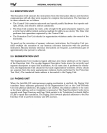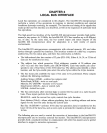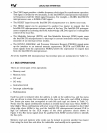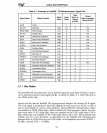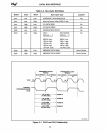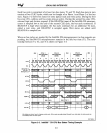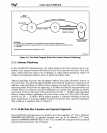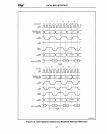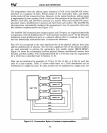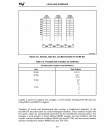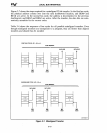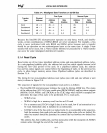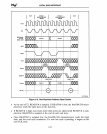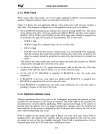
LOCAL BUS INTERFACE
BUB
States:
ALWAYS
READY
#
ASSERTED·
REQUEST
PENDING
T1-first
clock of a non-pipelined bus cycle (80386 drives new address
and
asserts
ADS")
T2-subsequent clocks of a
bus
cycle when
NA"
has
not been sampled asserted
in
the
current
bus
cycle
H-
idle state
The fastest bus
cycle consists of two states:
T1
and
T2.
READY#
NEGATED·
NA#
NEGATED
231732i3-3
Figure 3-3. Bus State Diagram (Does Not Include Address Pipelining)
3.1.2 Address Pipelining
In
the Intel386
OX
microprocessor, the timing address and status outputs can be con-
trolled
so
the outputs become valid before the end of the previous bus
cycle_
This tech-
nique, which allows bus cycles to be overlapped,
is
called address pipelining. Figure
3-4
compares non-pipelined address cycles to pipelined address cycles.
Address pipelining increases bus throughput without decreasing allowable memory or
I/O access time, thus allowing high bandwidth with relatively inexpensive components. In
addition, using pipelining to address slower devices can yield the same throughput
as
addressing faster devices with no pipelining. A 20-MHz Intel386
OX
microprocessor can
transfer data at the maximum rate of
40
megabytes per second while allowing an address
access time of three CLK cycles
(150 nanoseconds at CLK =
20
MHz neglecting signal
delays); without address pipelining, the access time
is
only two CLK cycles (100 nano-
seconds at CLK =
20
MHz). When address pipeline
is
activated following an idle bus
cycle, performance
is
decreased slightly because the first bus cycle cannot be pipelined.
This condition
is
explained
fully
in Chapter
4.
3.1.3 32-Bit Data Bus Transfers and Operand Alignment
The Inte1386
OX
microprocessor can address up to four gigabytes (2
32
bytes, addresses
OOOOOOOOH-FFFFFFFFH)
of physical memory and up to
64
kilobytes (2
16
bytes,
addresses
OOOOOOOOH-OOOOFFFFH)
of I/O. The Intel386
OX
microprocessor maintains
separate physical memory and
I/O spaces.
3-6



